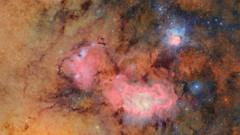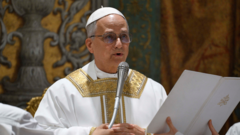**Lovell's heroic actions during Apollo 13 turned disaster into a triumph and shaped the future of America’s space exploration.**
**Jim Lovell, Apollo 13 Commander, Dies at 97: A Legacy of Heroism and Inspiration**

**Jim Lovell, Apollo 13 Commander, Dies at 97: A Legacy of Heroism and Inspiration**
**The iconic astronaut who brought his crew safely home after a near-fatal explosion in space has passed away.**
Jim Lovell, the esteemed astronaut whose leadership during the ill-fated Apollo 13 mission led to the safe return of his crew in 1970, has died at the age of 97. NASA honored Lovell's significant contributions, stating that he "turned a potential tragedy into a success" after an explosion aboard the spacecraft forced an abandonment of their lunar landing plans while they were far from Earth.
Millions of viewers worldwide held their breath as Lovell, along with fellow astronauts Jack Swigert and Fred Haise, successfully splashed down in the Pacific Ocean, solidifying the mission's place as one of the most revered moments in space travel history. Although he participated in two Apollo missions and was part of the first crew to orbit the Moon, Lovell never landed on its surface. Acting NASA Administrator Sean Duffy praised Lovell’s indelible impact on the U.S. space program, which paved the way for future explorations.
Lovell's family expressed profound sorrow, remembering his "unshakeable optimism" and humor as a source of inspiration for many. His childhood fascination with aviation and space eventually led him to a distinguished career in the Navy, which culminated in his selection as one of NASA's original astronauts.
Born on March 25, 1928, Lovell's life was marked by determination and sacrifice, as he navigated personal and professional challenges to achieve his dream of space travel. His early interests in aviation were sparked by a tragic childhood event—the death of his father in a car accident. Despite financial hardships, Lovell pursued a military education, eventually joining NASA's elite astronaut corps.
Lovell's first spaceflight was aboard Gemini 7, where he and his crew completed a two-week endurance test essential for future lunar missions. He later played a pivotal role in Apollo 8, the first mission to orbit the Moon, where the crew's famous "Earthrise" image inspired millions back home during a tumultuous time in American history.
In April 1970, Lovell and his Apollo 13 crew faced a life-altering crisis when an oxygen tank exploded, severely damaging their spacecraft. The crew's quick thinking and problem-solving, driven by Lovell's steady leadership, allowed them to use the lunar module as a lifeboat and safely navigate back to Earth, despite epic odds.
After retiring from the Navy in 1973, Lovell chose a quieter life away from the spotlight but remained a prominent voice in discussions related to space exploration and science education. His memoir, "Lost Moon," inspired the critically acclaimed film "Apollo 13," where Lovell, honoring his military past, appeared in a cameo as a naval officer.
His passing marks the loss of a true pioneer whose courage and tenacity will be remembered in both space history and the hearts of those inspired by his journey.
Millions of viewers worldwide held their breath as Lovell, along with fellow astronauts Jack Swigert and Fred Haise, successfully splashed down in the Pacific Ocean, solidifying the mission's place as one of the most revered moments in space travel history. Although he participated in two Apollo missions and was part of the first crew to orbit the Moon, Lovell never landed on its surface. Acting NASA Administrator Sean Duffy praised Lovell’s indelible impact on the U.S. space program, which paved the way for future explorations.
Lovell's family expressed profound sorrow, remembering his "unshakeable optimism" and humor as a source of inspiration for many. His childhood fascination with aviation and space eventually led him to a distinguished career in the Navy, which culminated in his selection as one of NASA's original astronauts.
Born on March 25, 1928, Lovell's life was marked by determination and sacrifice, as he navigated personal and professional challenges to achieve his dream of space travel. His early interests in aviation were sparked by a tragic childhood event—the death of his father in a car accident. Despite financial hardships, Lovell pursued a military education, eventually joining NASA's elite astronaut corps.
Lovell's first spaceflight was aboard Gemini 7, where he and his crew completed a two-week endurance test essential for future lunar missions. He later played a pivotal role in Apollo 8, the first mission to orbit the Moon, where the crew's famous "Earthrise" image inspired millions back home during a tumultuous time in American history.
In April 1970, Lovell and his Apollo 13 crew faced a life-altering crisis when an oxygen tank exploded, severely damaging their spacecraft. The crew's quick thinking and problem-solving, driven by Lovell's steady leadership, allowed them to use the lunar module as a lifeboat and safely navigate back to Earth, despite epic odds.
After retiring from the Navy in 1973, Lovell chose a quieter life away from the spotlight but remained a prominent voice in discussions related to space exploration and science education. His memoir, "Lost Moon," inspired the critically acclaimed film "Apollo 13," where Lovell, honoring his military past, appeared in a cameo as a naval officer.
His passing marks the loss of a true pioneer whose courage and tenacity will be remembered in both space history and the hearts of those inspired by his journey.
















